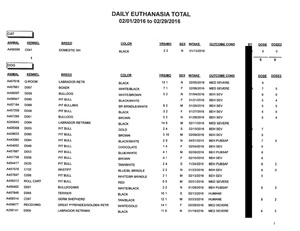 (click on image to see .pdf file) (click on image to see .pdf file) In late 2014, the City of Huntsville said that it had not destroyed any healthy or treatable dogs since October. We were thrilled and we took that news at face value. As part of our ongoing requests for public records, we began seeking (and still seek) monthly reports regarding the dogs destroyed at the shelter. Our analysis of those records revealed that all was not as it seemed. While we would have expected that the vast majority of dogs destroyed would have been destroyed to alleviate suffering or due to some serious medical conditions, the vast majority of dogs were being destroyed for a variety of issues related to behavior. We were surprised by this. We know that some dogs cannot be saved and genuinely do pose a public safety risk. Ordinarily, however, those dogs are in the low single percentages of overall shelter intake. In our case, approximately 80% of the dogs destroyed each month were being destroyed due to behavior. In October of 2014, 32 dogs were destroyed for behavioral issues. In January of 2015, that number rose to 50 dogs. In August of 2015, 25 dogs were destroyed for behavior. Even experts regarding the behavior of dogs in a shelter environment will agree that evaluating dogs in shelter is an imperfect process. A report from the National Canine Research Council concludes that, "shelter evaluations may tell us as much or more about the effect of the shelter as they do about the individual dogs. Shelters are noisy, alien environments, filled with strange smells, unfamiliar people, and dogs they may hear, but not see. We should not be surprised that some dogs may. . . behave differently when confined in a shelter, with its barrage of stressors that the dog cannot control, than they will in the safe, secure, predictable environment of a home, cared for by people with whom they are able to form positive attachments." In March of 2015, we expressed our concerns to the city and recommended that help be sought regarding how to properly and consistently evaluate dogs. We felt something was not right and we had two main concerns: 1) that otherwise good dogs who were just scared or traumatized were not being given a full and fair opportunity to be saved; and 2) that potentially dangerous dogs were making it out of the shelter to rescue groups and into adoptive and foster homes, creating a public safety risk. Our recommendation to the city was that it seek help from people who could train the staff on how to evaluate dogs. We specifically recommended that the city engage with representatives from Humane Network and with Kelley Bollen from the Animal Welfare Alliances in Massachusetts (and the former Director of Behavior Programs for the Shelter Medicine Program at Cornell University College of Veterinary Medicine). We are pleased to report that on March 22 and 23, 2016, Humane Network CEO Diane Blankenburg and Kelley Bollen were in Huntsville to provide two solid days of training and guidance to members of the shelter staff, county animal control officials, rescuers and volunteers. Members of our coalition were also invited to attend. We found the training and presentations not only incredibly informative, but were very pleased with the level of enthusiasm expressed by the shelter staff and how engaged they were in the training. There is a delicate balancing act for any animal shelter when it comes to ensuring public safety while striving to save the lives of healthy and treatable animals. It is our genuine hope that city officials, city employees, rescuers and shelter volunteers feel empowered by the training provided last week. We can all agree that dogs who are genuinely dangerous do not belong out in our community. We think it is likely that in any given month, only a small number of dogs who enter our shelter actually fit that category. We can also likely agree that a lot of dogs who end up in our shelter are just scared, confused or traumatized in some way and they deserve the very best opportunity to be reunited with their families or placed with new families through reliable evaluation methods. If your dog ended up in a shelter, how would he or she react? We are hopeful more dogs than ever will be saved moving forward using this new training and established procedures which set dogs up for success.
0 Comments
We have a page on our website where we post shelter statistics. They go back to 2008. The most recent statistics we have on the site are the monthly figures for December of 2015. We were asked yesterday why we don't have the year end numbers for 2015 and the monthly numbers for January and February of this year. We don't have them posted because the city has not provided them to us.
In Alabama, records related to the operation of the government are public records which can be sought by any person and for any reason under the Alabama Open Records Act. There are some exceptions to the Act, but it is pretty broad in terms of access and the records can be sought by anyone, whether they live in Alabama or not. When it comes to Madison County, seeking animal control records is a pretty simple process. We call or email the Animal Control Director and he provides the records, normally within a matter of minutes or hours. When it comes to the City of Huntsville, the process is not so simple. We have been given very clear instructions that we are not to communicate directly with the Animal Services Director and that our records requests must be submitted to the City Attorney's Office to be processed. This means that we prepare a letter each month which we submit to the City Attorney's Office setting forth the records we seek. We have been trying to get records regarding dogs destroyed in the last quarter of 2015 for months. We have been trying to get the 2015 year-end statistics since January. Our last letter to the City Attorney's Office was sent on March 7, 2016. We have considered speaking to an attorney for help in getting the records we seek. We have also considered getting the media involved. We have not yet decided what we plan to do about this issue. The records we seek don't have to be created. They already exist and it is a matter of printing them off of a computer or otherwise saving them as a .pdf file. In spite of the opinions of those who oppose us for our advocacy, we have worked incredibly hard since our coalition formed to be both diplomatic and respectful in our communication with and criticism of the city and Huntsville Animal Services. We have made a concerted effort to applaud progress made by the city even when we have been under attack on social media. In the fall of last year, a "hate" page was created about our coalition on Facebook. We didn't talk about it publicly we didn't want to draw attention to it. It contained content which was juvenile, vulgar and libelous, much of which was "liked" and commented on by city employees, shelter volunteers and prominent members of local rescue organizations. We took steps to try to have the page removed while refusing to stoop to the level of those who felt that type of behavior was appropriate or productive. As they saying goes, we just would not "go there." The city has made enough progress in the last year that there is little point in remaining overly critical and risk having people think we won't be satisfied with any level of progress. Although ours is not yet a no kill community, Huntsville has made a great amount of progress in a short amount of time and the value of that cannot be overstated. We remain hopeful the city will make a commitment to make ours a no kill community and declare that healthy and treatable animals are not at risk under any circumstances. We believe that with increased progress and increased expectations by the city that the public will both be part of change and fully support change comes the need for complete transparency in record keeping. It is vital in order to both get and maintain the public trust. The ASPCAs Position Statement on Responsibilities of Animal Shelters speaks to this very point: Goal 4: Animal sheltering is increasingly transparent The ASPCA strongly supports a requirement that key records and data be maintained by all shelters, both public and private, routinely reported to an appropriate central entity, and made available to the public. While much of this information, for public shelters at least, may already be considered a public record under various state laws, the ASPCA believes that standardizing the information that must be collected and extending these requirements to private shelters is not only an important step toward transparency, but also an effective way to gain a fuller picture of the community’s at-risk animals. When the only information available concerning intake and outcomes is that which must be provided by public shelters through Freedom of Information Act (FOIA) requests, the public is receiving an incomplete and perhaps distorted representation of these matters. There is a video on the city's Youtube channel which shows Mayor Battle interviewing Dr. Sheppard about the operation of Huntsville Animal Services and talking about the tremendous progress made at our shelter in recent months. At one point in the interview, Mayor Battle calls Dr. Sheppard a star. Although we have been quite complimentary of that progress, it is somewhat difficult for us to be quite as thrilled with the progress because of the city's lack of transparency regarding the shelter records. Once we have been provided the records we seek, we will post them on our website. The City of Huntsville should have nothing to hide. And we look forward to seeing that with our own eyes very soon when we are provided the records we have sought not just for us but for our entire community. |
No Kill Huntsville
Keep up with our updates and latest news regarding Huntsville becoming a no kill community. Archives
January 2022
Categories
All
image courtesy of Terrah Johnson
|


 RSS Feed
RSS Feed
